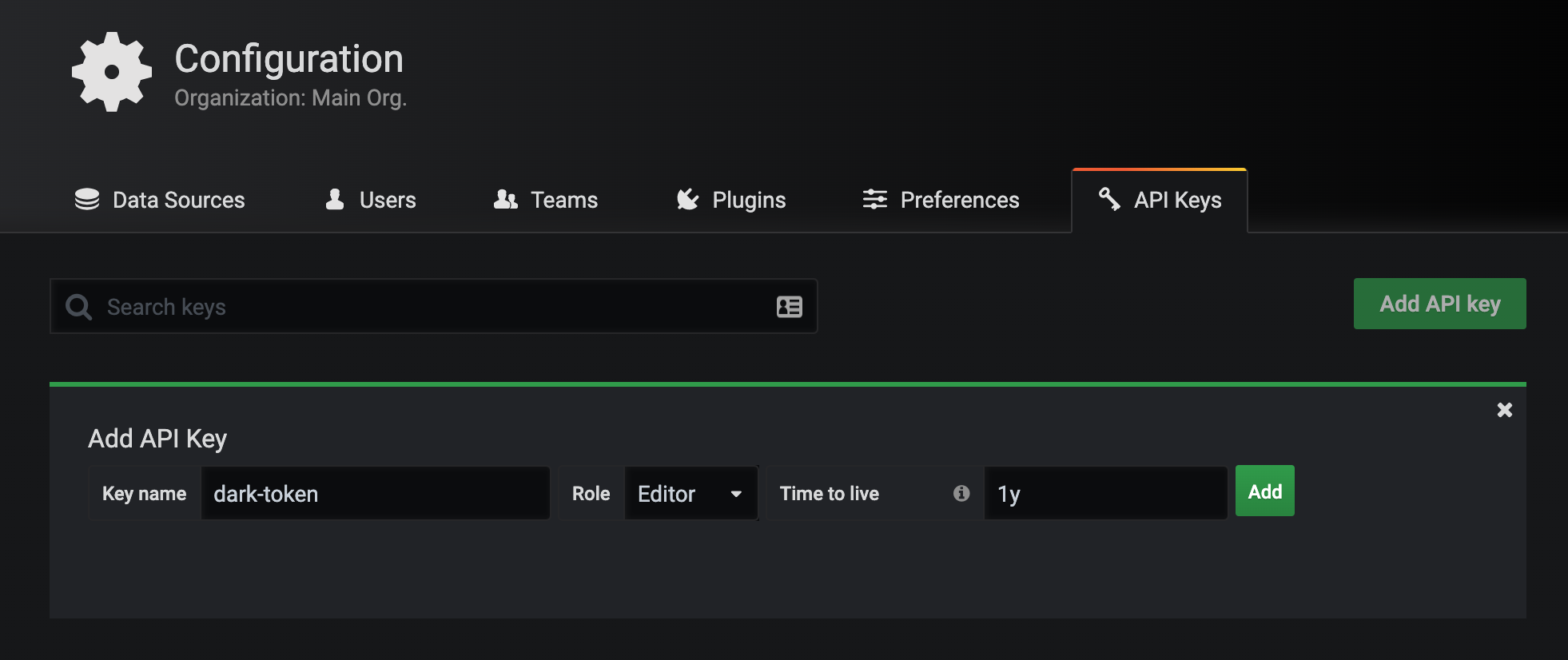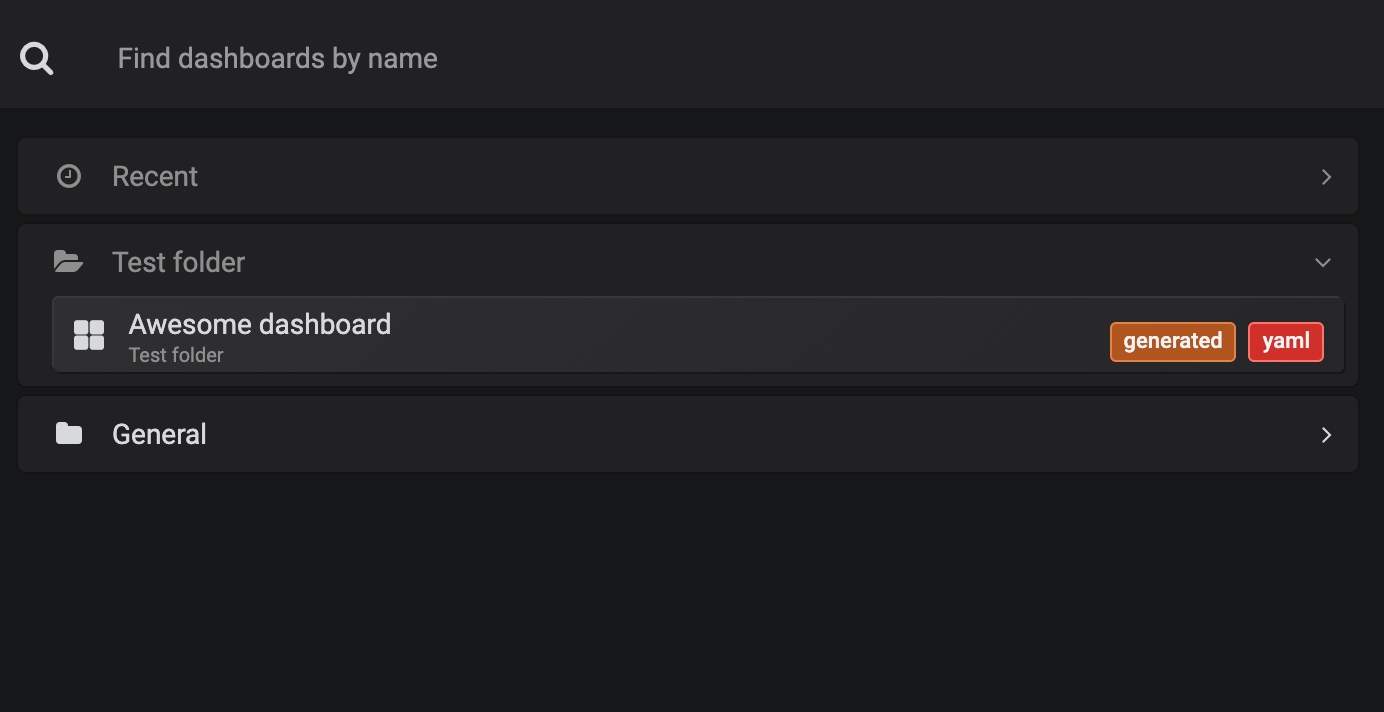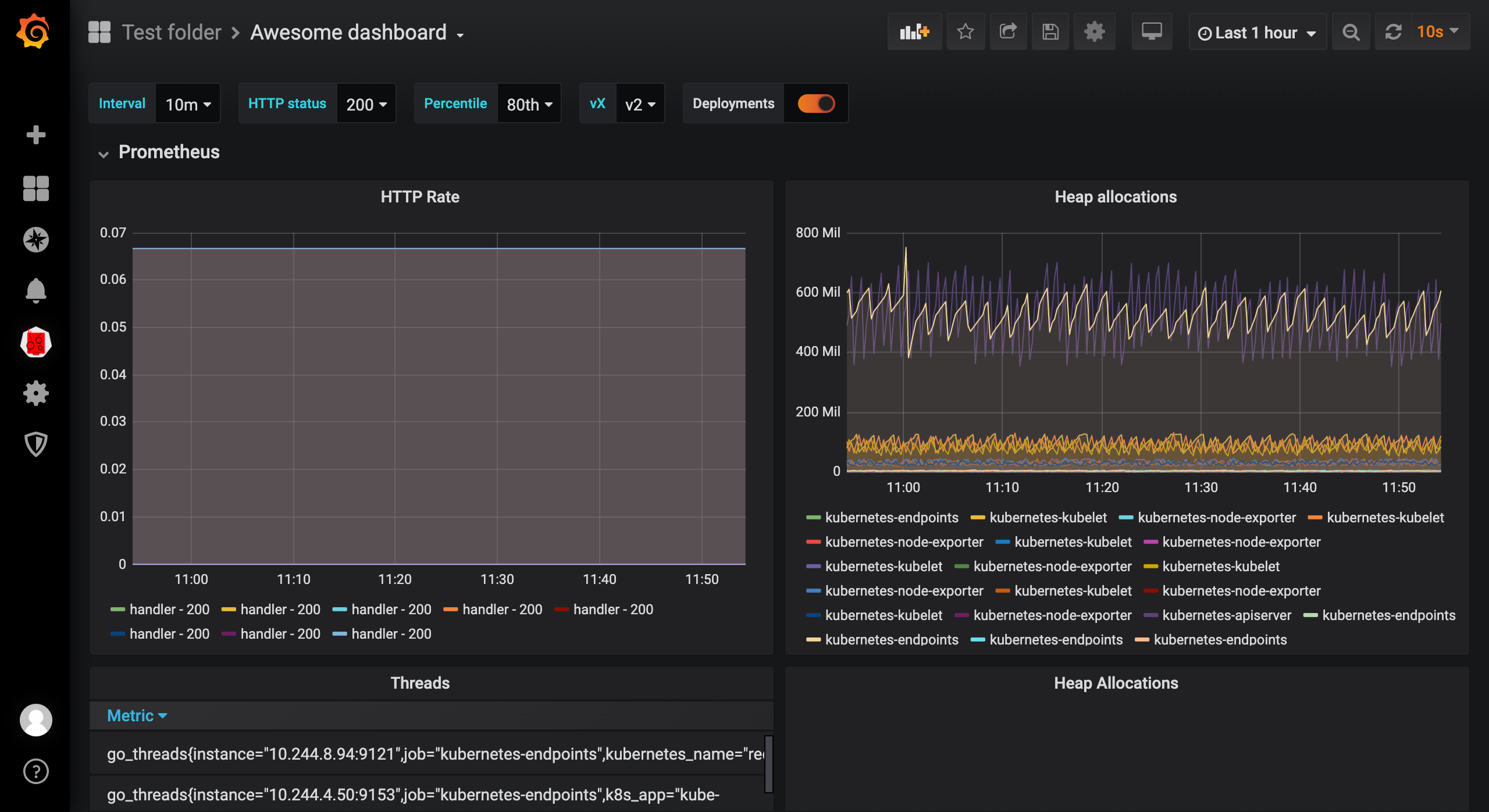我们在使用 Grafana Dashboard 来展示我们的监控图表的时候,很多时候我们都是去找别人已经做好的 Dashboard 拿过来改一改,但是这样也造成了很多使用 Grafana 的人员压根不知道如何去自定义一个 Dashboard,虽然这并不是很困难。这里我们介绍一个比较新颖(骚)的工具:DARK,全称 Dashboards As Resources in Kubernetes.,意思就是通过 Kubernetes 的资源对象来定义 Grafana Dashboard,实现原理也很简单,也就是通过 CRD 来定义 Dashboard,然后通过和 Grafana 的 API Token 进行交互实现 Dashboard 的 CRUD。
下面我们来看下如何使用 DARK 定义 Grafana Dashboard。首先 Clone 项目代码:
$ git clone https://github.com/K-Phoen/dark.git
然后安装 CRD 资源:
$ kubectl apply -f k8s/crd.yaml
然后通过 Secret 对象创建 Grafana 的 API KEYS,在 Grafana 主界面中,选择左侧的配置菜单 -> API Keys 创建 API Keys,选择 Editor 的角色:

创建完成后会弹出一个对话框显示对应的 API Keys,使用这个 KEY 来创建一个对应的 Secret 对象:
$ kubectl create secret generic dark-tokens --from-literal=grafana=<替换成APIKEY>
然后修改 k8s/cluster-role.yaml 文件,如下所示:
apiVersion: v1
kind: ServiceAccount
metadata:
name: dark
---
kind: ClusterRole
apiVersion: rbac.authorization.k8s.io/v1
metadata:
name: dashboards-viewer
rules:
- apiGroups: ["k8s.kevingomez.fr"]
resources: ["grafanadashboards"]
verbs: ["get", "watch", "list"]
- apiGroups: [""]
resources: ["events"]
verbs: ["create", "patch"]
---
apiVersion: rbac.authorization.k8s.io/v1
kind: ClusterRoleBinding
metadata:
name: dashboards-viewer-cluster
subjects:
- kind: ServiceAccount
name: dark
namespace: default
roleRef:
kind: ClusterRole
name: dashboards-viewer
apiGroup: rbac.authorization.k8s.io
然后创建上面的资源对象:
$ kubectl apply -f k8s/cluster-role.yaml
修改 k8s/deployment.yaml 文件,将 GRAFANA_HOST 环境变量修改成自己的 Grafana 的地址,由于我这里 Grafana 也安装在 Kubernetes 集群中的,所以直接用 DNS 形式配置,然后加上上面创建的 dark 这个 ServiceAccount:
apiVersion: apps/v1
kind: Deployment
metadata:
name: dark
labels:
app: dark
spec:
selector:
matchLabels:
app: dark
template:
metadata:
labels:
app: dark
spec:
volumes:
- name: dark-tokens
secret:
secretName: dark-tokens
serviceAccountName: dark
containers:
- name: dark
image: kphoen/dark:latest
env:
- name: GRAFANA_HOST
value: http://grafana.kube-mon:3000
- name: GRAFANA_TOKEN
valueFrom:
secretKeyRef:
key: grafana
name: dark-tokens
修改完成后直接创建上面的 Controller:
$ kubectl apply -f k8s/deployment.yaml
$ kubectl get pods -l app=dark
NAME READY STATUS RESTARTS AGE
dark-6bd956b8d6-755p2 1/1 Running 0 36m
现在 Controller 定义好过后,实际上我们就可以去通过 CRD 对象来定义 Grafana Dashboard 了,如下所示定义了一个 GrafanaDashboard 对象,在对象中我们完全就可以根据自己的需求去定义内容了,比如定义 annotations、variables、graph、table 都可以,当然最重要的还是数据源要正确,以及查询语句:(example-dashboards.yaml)
apiVersion: k8s.kevingomez.fr/v1
kind: GrafanaDashboard
metadata:
name: example-dashboard
folder: "Test folder"
spec:
title: Awesome dashboard
editable: true
shared_crosshair: true
tags: [generated, yaml]
auto_refresh: 10s
tags_annotations:
- name: Deployments
datasource: "Prometheus"
color: "#5794F2"
tags: ["deploy", "production"]
variables:
- interval:
name: interval
label: Interval
values: ["30s", "1m", "5m", "10m", "30m", "1h", "6h", "12h"]
- query:
name: status
label: HTTP status
datasource: Prometheus
request: "label_values(prometheus_http_requests_total, code)"
- const:
name: percentile
label: Percentile
default: 80
values_map:
50th: "50"
75th: "75"
80th: "80"
85th: "85"
90th: "90"
95th: "95"
99th: "99"
- custom:
name: vX
default: v2
values_map:
v1: v1
v2: v2
rows:
- name: Prometheus
panels:
- graph:
title: HTTP Rate
height: 400px
datasource: Prometheus
targets:
- prometheus:
query: "rate(promhttp_metric_handler_requests_total[$interval])"
legend: "{{handler}} - {{ code }}"
- graph:
title: Heap allocations
height: 400px
datasource: Prometheus
targets:
- prometheus:
query: "go_memstats_heap_alloc_bytes"
legend: "{{job}}"
ref: A
- table:
title: Threads
datasource: Prometheus
targets:
- prometheus:
query: "go_threads"
hidden_columns: ["Time"]
time_series_aggregations:
- label: AVG
type: avg
- label: Current
type: current
- single_stat:
title: Heap Allocations
datasource: Prometheus
targets:
- prometheus:
query: 'go_memstats_heap_alloc_bytes{job="prometheus"}'
unit: bytes
thresholds: ["26000000", "28000000"]
color: ["value"]
- name: "Some text, because it might be useful"
panels:
- text:
title: Some awesome text?
markdown: "Markdown syntax help: [commonmark.org/help](https://commonmark.org/help/)\n${percentile}"
- text:
title: Some awesome html?
html: "Some <b>awesome</b> html?"
同样直接创建上面的示例文件:
$ kubectl apply -f example-dashboards.yaml
$ kubectl get dashboards
NAME AGE
example-dashboard 35m
$ kubectl logs -f dark-6bd956b8d6-755p2
W0327 11:10:24.356194 1 client_config.go:543] Neither --kubeconfig nor --master was specified. Using the inClusterConfig. This might not work.
I0327 11:10:24.360886 1 controller.go:87] Setting up event handlers
I0327 11:10:24.362305 1 controller.go:118] Starting dark-controller
I0327 11:10:24.362341 1 controller.go:121] Waiting for informer caches to sync
I0327 11:10:24.462733 1 controller.go:126] Starting workers
I0327 11:10:24.462820 1 controller.go:132] Started workers
I0327 11:13:22.641706 1 controller.go:197] Successfully synced 'default/example-dashboard'
I0327 11:13:22.643061 1 event.go:278] Event(v1.ObjectReference{Kind:"GrafanaDashboard", Namespace:"default", Name:"example-dashboard", UID:"efc6f96f-c7fc-40b5-8b8f-831a95b0a042", APIVersion:"k8s.kevingomez.fr/v1", ResourceVersion:"48490732", FieldPath:""}): type: 'Normal' reason: 'Synced' GrafanaDashboard synced successfully
在 Controller 中也可以看到对应的日志信息,资源对象创建成功以后,现在去 Grafana 页面上查看可以看到已经新增了一个 Test folder 的文件夹以及 Awesome dashboard:

查看 Dashboard 就可以看到和上面 CRD 中定义的各种图表信息了:

这样我们就使用 Kubernetes 资源对象去定义了 Grafana Dashboard 了,这种方式比直接在页面上去手动配置显然要更优雅,也符合 everything as code 的思想 🤯。
微信公众号
扫描下面的二维码关注我们的微信公众帐号,在微信公众帐号中回复◉加群◉即可加入到我们的 kubernetes 讨论群里面共同学习。




